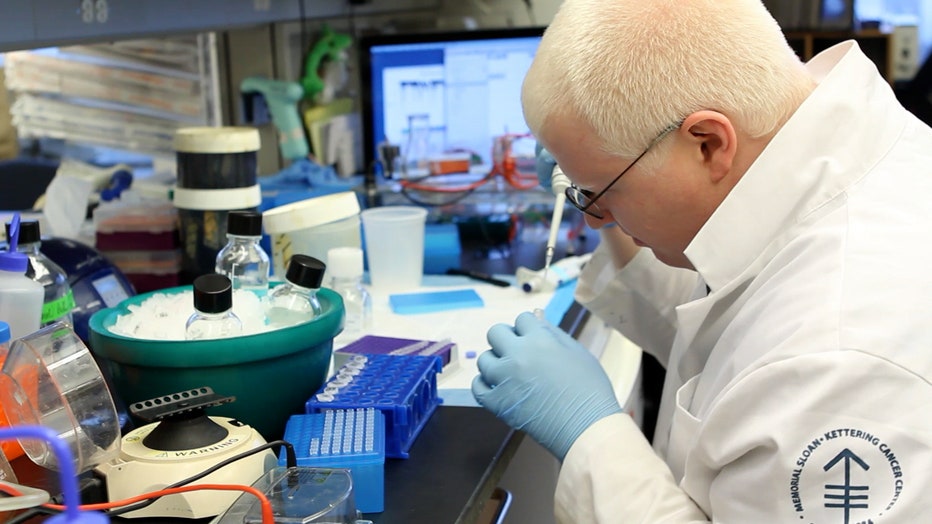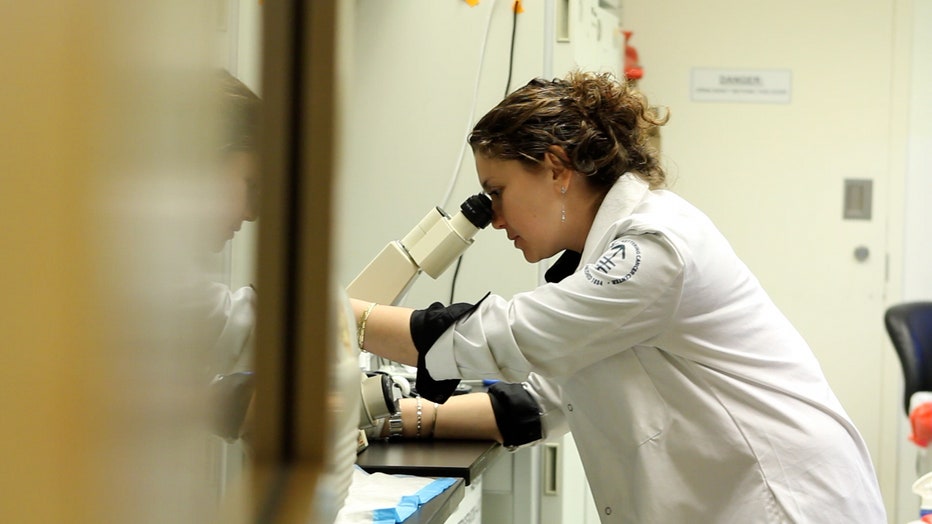Nearly a third of leukemia patients saw remission after taking experimental pill

'Incredible breakthrough': Experimental pill could cure leukemia
Dr. Ghayas "Gus" Issa and Dr. Eytan Stein spoke with FOX TV Stations and LiveNOW from FOX to discuss the success rate of the experimental pill revumenib and what the future holds.
For some leukemia patients who have had trouble responding to certain types of cancer therapies, there may still be hope for an effective and possibly permanent treatment.
Revumenib is an experimental pill that just ended its phase 1 trial. Of the 68 participants in the trial, 53% saw an overall positive response to treatments and 30% saw remission with no detectable cancer cells.
"With the currently available therapies, the chances of achieving a remission is in the range of 5%, maybe 10%. So this is a huge advance," said Dr. Eytan Stein, chief of the leukemia service at Memorial Sloan Kettering Cancer Center in New York City.

Researchers at Memorial Sloan Kettering Cancer Center in New York City. (Memorial Sloan Kettering Cancer Center )
What is revumenib?
Revumenib is a pill currently in its second trial phase that has the capability to inhibit the protein menin, which is basically the key to turning regular cells into cancer cells for specific types of leukemia.
Revumenib blocks that protein and rehabilitates what were once cancerous cells into healthy cells.
"Almost all the therapies we have to treat cancer, the goal of the therapy is to kill the cancer cells, right? You give this poison or immunotherapy and it kills the cancer cells. And what we're doing here, what this drug is doing is it's actually taking the cancer cells and basically rehabilitating them and saying, ‘You know, we're not going to kill you, we're just going to make you behave well and turn into something that's normal and does what a normal cell is supposed to do.’ And it's really a radically different way of thinking about treating cancer than almost all other therapies for cancer over the past 50 to 100 years," Stein added.
How does it work?
The first phase of the trial began in 2019, and participants were instructed to take two pills a day. A liquid form was also available for child participants.
The medication was allowed to be taken at home.
"Leukemia cells, the protein menin, has a pocket within it as a part where the critical driver of leukemia and these subsets, KMT2A, fits. And this drug creates a wedge between the driver and menin by filling that pocket. So now the key and the engine are displaced. And whatever that machine that causes the abnormal transcription or abnormal program in leukemia as needed, is no longer where it should be, and the cell reverts back to normal," Dr. Ghayas "Gus" Issa, a leukemia physician at the MD Anderson Cancer Center at the University of Texas, told FOX TV Stations.
What kind of cancer can it treat?
For now, revumenib is currently only being observed in patients with acute leukemia and acute lymphoblastic leukemia, which is common in children, but that doesn’t mean this treatment cannot eventually expand to treat other forms of cancers.
"So it impacts two subsets of patients with acute leukemia generally, not just acute myeloid leukemia, but also a disease that is very common in kids called acute lymphoblastic leukemia. So it's those patients with those diseases that have this genetic rearrangement called a KMT2A-rearrangement," Stein said.
"And then also patients with a mutation in a gene called NPM1. And maybe the more important thing is that combined, that probably represents about 40% to 50% of patients with acute myeloid leukemia. So almost half the patients with acute myeloid leukemia will have one of these abnormalities. And then many children, not as many as I just mentioned, but many children will also have this rearrangement. So it also bridges the gap between pediatric cancers and adult cancers, which is something that we don't always see, which makes it exciting," Stein continued.

(Memorial Sloan Kettering Cancer Center )
What were the results?
A total of 68 patients were involved in the phase 1 trial.
Of the 68 patients, eight were 18 years or younger and the ages ranged between 10 months and 72 years.
Fifty-three percent of patients saw an overall or had some sort of positive response to the medication.
The median time that patients began to see remission of their cancer was 1.9 months.
"We looked under the microscope into their bone marrow, which is the factory of blood cells and leukemia, and we couldn't see any leukemia cells under the microscope. And about 30% had what we call a complete response or a complete response with partial recovery. That means that their leukemia cells were not detected, but also their normal cells came back to a level that is equivalent to someone who doesn't have leukemia. So these are very promising results. If we contrast it to any therapy that's available, we would not get these chances of response," Issa said.
The currently available therapies for these types of cancers achieve a remission rate ranging between 5% and 10%, according to Stein.
"So this is a huge advance," he said.
So far, the side effects to revumenib are minimal, according to Issa.
One patient did experience impacts to their heart’s electrical system, however, this was a predicted side effect and was detected through the use of an electrocardiogram (ECG/EKG).
Patients who experienced this side effect were told to stop taking the medication. It ended up being resolved in all of the patients who were treated and it did not happen again, Issa said.
The second notable side effect was differentiation syndrome.
"Sometimes through that process, when the leukemia cells are turned into normal cells, some people react abnormally to it. The body overreacts by having this rush of normal cells back in the body. And if it's not recognized, it could be dangerous. But in this case, we recognized it on time and we were able to reverse it in all the cases, and it didn't lead to any complications to patients. Otherwise, if we're comparing it to other medications, far fewer dangerous side effects than a lot of treatments we use for leukemia," Issa said.
What’s next?
Further studies need to be done, and patients from this phase 1 trial will continue to get check ups as they take the experimental medication.
Currently, revumenib is entering its phase 2 trial but other studies are also in the works, according to Stein.
While the results for these specific subtypes of leukemia are exciting, both Stein and Issa are hoping to expand the medication to other types of leukemia to see if the results they have seen thus far can also be seen in different cancer patients.
"So we have a study that's going to be starting hopefully in the next three to six months looking at this drug in other types of leukemia, where we think meaning is important to really expand, you know, expand the indication or the number of patients that might benefit from this compound," Stein said.
"The research that was done over the past 10 to 15 years in the laboratory have gotten us to this place where we now have targeted therapies and other therapies for all types of cancers. And the survival in patients with cancer is really dramatically increasing across many, many types of cancers. But that wouldn't happen had we not invested in really the basic research that we need to understand how these cancers grow and how these cancers are propagated," Stein continued.
"As someone who does this for a living, this is incredibly gratifying, just to apply the science that had been developed for years and to use it to change someone's life," Issa added. "Some of these patients … had no other hope, and to take them through that explanation, to tell them, with a lot of question marks, and them trusting us and saying that, ‘This might work. We think it's a good medication, but we don't know yet.’ And then finally getting to it a month later and telling them that they're in remission and they can continue with their lives is a really incredible feeling.
"And it's also hope for clinical research. Without doing these steps, we would never be able to advance future studies."
This story was reported from Los Angeles.

